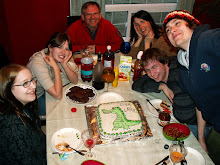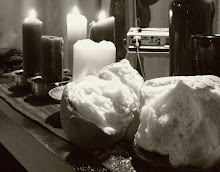This is a bit of a summary of my talk for January 26. It is built off a book by Jonathan Wilson called Why Church Matters.
About purpose...
“Telos is a bit like ‘purpose’ or ‘goal’.” But not in the same sense as achieving something. Take the example of a hammer: “A hammer cannot choose between sawing boards or driving nails.” Driving nails is the telos of the hammer. “The point is that the telos of the hammer is given to it, not chosen by it.” (p. 12)
“Likewise, the church does not choose its purpose or achieve its goal; rather, its telos is given to it by God, who chooses the church to bear witness to the gospel.” (p. 13)
Often today, “…we think that such purpose and meaning are found by human effort.”
When we abandon our God given purpose (telos) for something else, we have no compelling reason for doing anything except “What I do makes me feel good” or “I do what I do because this is what I have chosen to do.” (p. 14)
Culture has lost its telos largely because of the me-centeredness of contemporary thinking – relates to the “framing story” Jackie talked about last week.
I think church has sometimes also lost its telos as well. We have accepted the framing story of culture which is “what makes me happy, gives me prosperity, security and feels life giving.” This is different from what Jesus requires – count the cost, deny self, take up cross, the greatest least, servant of all, etc.
About Community…
The word “church” in the Bible means gathering. NT believers would never have dreamed of a privatized (only personal) faith. Wilson calls the church the “disciple community”
Acts 15 – plural terminology: “The church sent them on their way… they were welcomed by the church… the apostles and elders, with the whole church, decided… So we all agreed…”
Hebrews 10 “Let us hold unswervingly to the hope we profess, for he who promised is faithful. And let us consider how we may spur one another on toward love and good deeds. Let us not give up meeting together, as some are in the habit of doing, but let us encourage one another—and all the more as you see the Day approaching.”
Wilson says, “The church does not exist apart from the practices that embody its good and constitute it as a community.” The church does not have an identity outside community. (p. 18)
“…the church’s life is energized in the midst of ‘circulating’ in the world as well as in gathering together.” “Likewise, the mission of the church is fulfilled when it gathers for worship and instruction as well as when it goes into the world to serve.”
About worship…
“One of the mistakes we make is thinking that worship of God comes naturally and can be learned ‘spontaneously,’ without instruction.” “Worship is work of the people because the practice of worship cannot be learned alone.” (p. 26) We are supposed to learn it in community – in gathering.
“I cannot learn or sustain worship as a practice faithful to the gospel apart from a people who are learning the same.” (p. 27)
About witness…
Witness as community activity “Too often we have treated witness as a solo act rather than a communal act. In the New Testament, witness is centered in the life of the community.” (p. 76) – relates to learning to witness as community – e.g. Angus Campbell, St. Aidan’s
Dangers of individualism “…Christian community is broken by sinful alienation and forgetfulness.” (p. 85)
Witness is holistic: “We are witnessing to the kingdom when we care for someone’s bodily needs just as fully as when we talk to them about a ‘change of heart.’ ” (p. 84)
About control and freedom…
John 8 “Then you will know the truth and the truth shall set you free.”
2 Corinthians 3 “Where the Spirit of the Lord is, there is freedom”
Galatians 5 “It is for freedom that Christ has set us free”
“In modernity, we maximize our control in order to maximize our freedom to determine our own destinies.” (p. 89) – more framing stories
Making disciples “…involves the call not to give up our freedom but to discover our true freedom in submission to the teacher of the kingdom, the Lord of life, Jesus Christ. …following Jesus is a lifelong process of rebellion against the powers of this age. … the church must emphasize that discipleship occurs only in the context of a community of disciples.” (p. 94)
Let’s keep striving to be “bearers of the Gospel” those whose lives are communally centered around the person of Jesus.
Subscribe to:
Post Comments (Atom)











1 comment:
So in other words - we need community to grow. It has often been said that you cannot grow by yourself outside of community but do we actually believe it. I think that is demonstrated within our commitment to show up on Saturday nights as well as showing up at different times that we gather. Not saying that worship cannot happen in the private and quiet of our home, but should that be our main focus. I believe our hearts are revealed as we come together and worship together as a community. I do believe that worship happens outside the service time. This might be a belief that many people have to truly make a community strong. Strength is not within our numbers but as a community that grows together and struggles together. And in that strength we are able to be set free to minister and touch the lives of others for God's glory. Maybe it is seeing kingdom work done as a community being built and seen by others as we build each other up while helping others. Growth through service as Nathan suggested.
Post a Comment